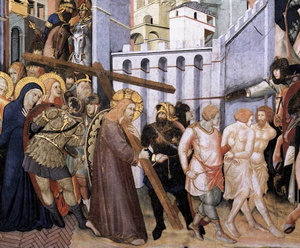Variations
Some countries around the world call it Good Friday while others do not. In some places the last workday of the week before Easter is prefixed with words such as "Holy" (e.g. Holy Friday), "Great," "Black," "Long" and "Silent."
Interestingly, the Bible is does not mention any religious observance on the Friday before a commonly believed Sunday morning resurrection of Jesus. In fact, in the King James Bible translation, the name of the day does not appear ANYWHERE in the New Testament! The only day given a name in Scripture is the seventh day (the Sabbath). All other days are simply labeled based on their sequence during the week.
The first day of the week cometh Mary Magdalene early, when it was yet dark, unto the sepulchre, and seeth the stone taken away from the sepulchre (John 20:1, KJV).
A 1911 Encyclopedia states the following about this day.
"The origin of the custom of a yearly commemoration of the Crucifixion is somewhat obscure. It may be regarded as certain that among Jewish Christians it almost imperceptibly grew out of the old habit of annually celebrating the Passover on the 14th of Nisan" (Nisan, also called Abib, is the first month of the Hebrew year).

This day was made a fast day by the Roman Catholic Church in the 4th century A.D., long after Jesus died. Its purpose is to commemorate the crucifixion and death of Jesus. The following is the Catholic Church's explanation.
"Good Friday is the English designation of Friday in Holy Week . . . (the day) on which the Church keeps the anniversary of the Crucifixion of Jesus Christ.
"From the earliest times the Christians kept every Friday as a feast day; and the obvious reasons for those usages explain why Easter is the Sunday par excellence, and why the Friday which marks the anniversary of Christ's death came to be called . . .
"Some say it (the term) is from Gottes Freitag; others maintain that it is from the German Gute Freitag, and not specially English." (The Catholic Encyclopedia, Volume VI, 1909).
Another source clarifies why the Catholics called for a fast on this "good" day, how someone might observe it, and when the death of Jesus is actually celebrated.
"The Catholic Church treats (this day) as a fast day, which in the Latin Rite of the Church is understood as having only one full meal (but smaller than a regular meal) and two collations (a smaller repast, two of which together do not equal one full meal) and on which the faithful abstain from eating meat.
"In countries where (it is celebrated it) is not a day of rest from work, the afternoon liturgical service is usually put off until a few hours after the recommended time of 3 p.m.
"The Celebration of the Passion of the Lord takes place in the afternoon, ideally at three o'clock, but for pastoral reasons a later hour may be chosen. The vestments used (by Roman Catholic priests) are red (more commonly) or black (more traditionally)."
According to Catholic dogma, which has largely been carried over into the Protestant churches, Jesus was killed on Friday and resurrected Sunday morning in 33 A.D. (or other nearby year). It is the anniversaries of these dates that are observed as part of Easter.
No Basis in Scripture
The origin of what is called Easter has no Biblical basis whatsoever. The early New Testament church neither taught nor observed an Easter holiday. In order to move people away from celebrating the Biblical Christian Passover, the Catholic Church adopted and Christianized a pagan holiday that celebrated the false goddess Ishtar (Astarte). The Babylonians and Assyrians worshipped this goddess. She symbolized fertility, love, war, and sex. The holiday in her honor occurred around the spring equinox.
According to the Bible, Jesus was crucified and died at 3 p.m. on a Wednesday (in 30 A.D.), spent three full days and nights in a tomb (72 hours total), then was resurrected back to life by God just before sunset Saturday. Jesus, in order to fulfill various prophecies, could not have died on "Good Friday!"